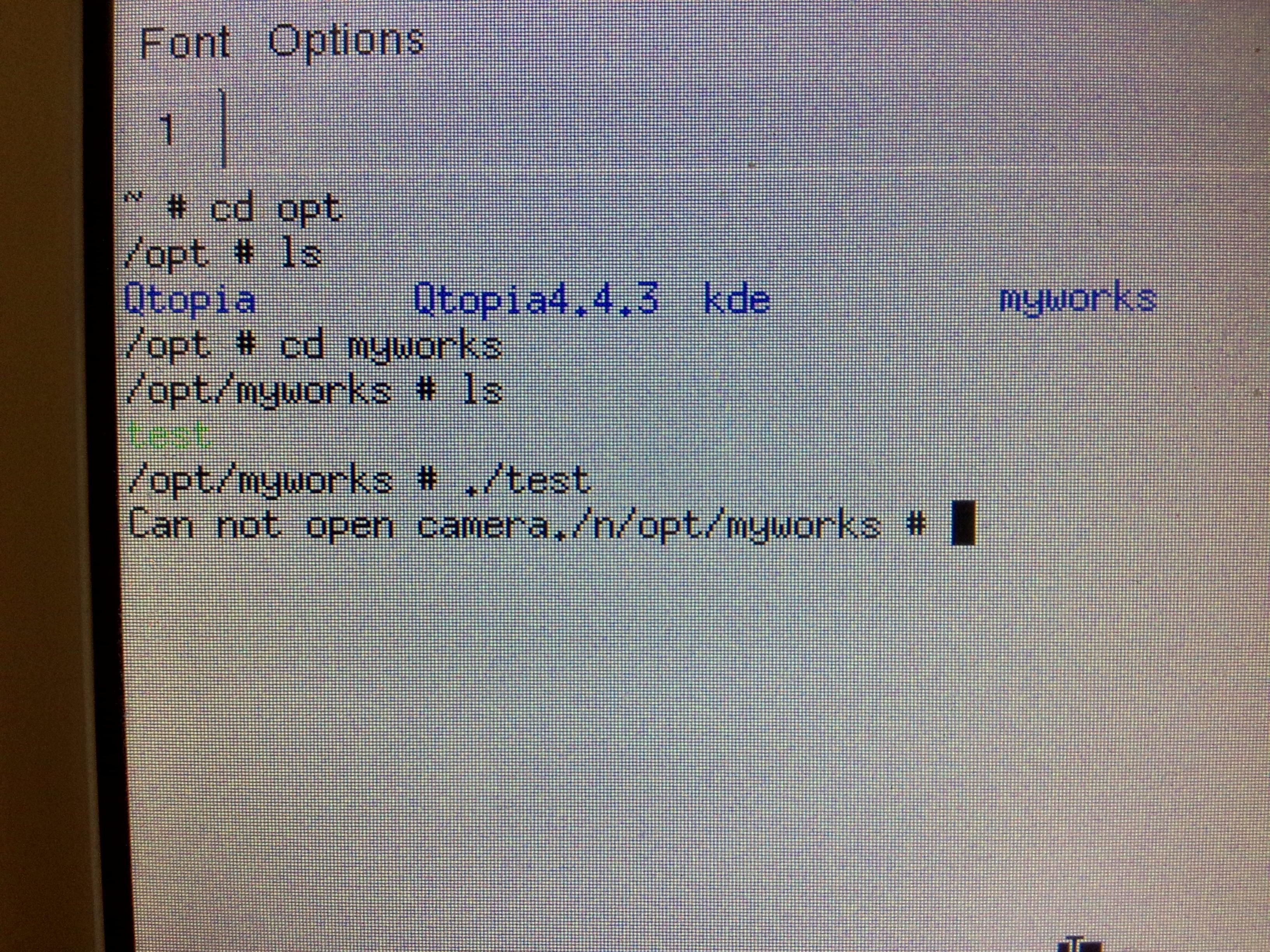结合opencv,在arm开发板上运行打开摄像头test文件,出现错误。。如下图:
Posted
tags:
篇首语:本文由小常识网(cha138.com)小编为大家整理,主要介绍了结合opencv,在arm开发板上运行打开摄像头test文件,出现错误。。如下图:相关的知识,希望对你有一定的参考价值。
将交叉编译好的opencv,中.so文件放到ARM开发板下lib中,然后将编译好的打开摄像头的test在ARM开发板中运行,出现“can not open camera”错误,求大神指教!!如有知道的大神希望加我qq:1208489229,在此先谢谢啦。

编写DetectFaceDemo.java,代码如下:
[java] view
plaincopyprint?
package com.njupt.zhb.test;
import org.opencv.core.Core;
import org.opencv.core.Mat;
import org.opencv.core.MatOfRect;
import org.opencv.core.Point;
import org.opencv.core.Rect;
import org.opencv.core.Scalar;
import org.opencv.highgui.Highgui;
import org.opencv.objdetect.CascadeClassifier;
//
// Detects faces in an image, draws boxes around them, and writes the results
// to "faceDetection.png".
//
public class DetectFaceDemo
public void run()
System.out.println("\nRunning DetectFaceDemo");
System.out.println(getClass().getResource("lbpcascade_frontalface.xml").getPath());
// Create a face detector from the cascade file in the resources
// directory.
//CascadeClassifier faceDetector = new CascadeClassifier(getClass().getResource("lbpcascade_frontalface.xml").getPath());
//Mat image = Highgui.imread(getClass().getResource("lena.png").getPath());
//注意:源程序的路径会多打印一个‘/’,因此总是出现如下错误
/*
* Detected 0 faces Writing faceDetection.png libpng warning: Image
* width is zero in IHDR libpng warning: Image height is zero in IHDR
* libpng error: Invalid IHDR data
*/
//因此,我们将第一个字符去掉
String xmlfilePath=getClass().getResource("lbpcascade_frontalface.xml").getPath().substring(1);
CascadeClassifier faceDetector = new CascadeClassifier(xmlfilePath);
Mat image = Highgui.imread(getClass().getResource("we.jpg").getPath().substring(1));
// Detect faces in the image.
// MatOfRect is a special container class for Rect.
MatOfRect faceDetections = new MatOfRect();
faceDetector.detectMultiScale(image, faceDetections);
System.out.println(String.format("Detected %s faces", faceDetections.toArray().length));
// Draw a bounding box around each face.
for (Rect rect : faceDetections.toArray())
Core.rectangle(image, new Point(rect.x, rect.y), new Point(rect.x + rect.width, rect.y + rect.height), new Scalar(0, 255, 0));
// Save the visualized detection.
String filename = "faceDetection.png";
System.out.println(String.format("Writing %s", filename));
Highgui.imwrite(filename, image);
package com.njupt.zhb.test;
import org.opencv.core.Core;
import org.opencv.core.Mat;
import org.opencv.core.MatOfRect;
import org.opencv.core.Point;
import org.opencv.core.Rect;
import org.opencv.core.Scalar;
import org.opencv.highgui.Highgui;
import org.opencv.objdetect.CascadeClassifier;
//
// Detects faces in an image, draws boxes around them, and writes the results
// to "faceDetection.png".
//
public class DetectFaceDemo
public void run()
System.out.println("\nRunning DetectFaceDemo");
System.out.println(getClass().getResource("lbpcascade_frontalface.xml").getPath());
// Create a face detector from the cascade file in the resources
// directory.
//CascadeClassifier faceDetector = new CascadeClassifier(getClass().getResource("lbpcascade_frontalface.xml").getPath());
//Mat image = Highgui.imread(getClass().getResource("lena.png").getPath());
//注意:源程序的路径会多打印一个‘/’,因此总是出现如下错误
/*
* Detected 0 faces Writing faceDetection.png libpng warning: Image
* width is zero in IHDR libpng warning: Image height is zero in IHDR
* libpng error: Invalid IHDR data
*/
//因此,我们将第一个字符去掉
String xmlfilePath=getClass().getResource("lbpcascade_frontalface.xml").getPath().substring(1);
CascadeClassifier faceDetector = new CascadeClassifier(xmlfilePath);
Mat image = Highgui.imread(getClass().getResource("we.jpg").getPath().substring(1));
// Detect faces in the image.
// MatOfRect is a special container class for Rect.
MatOfRect faceDetections = new MatOfRect();
faceDetector.detectMultiScale(image, faceDetections);
System.out.println(String.format("Detected %s faces", faceDetections.toArray().length));
// Draw a bounding box around each face.
for (Rect rect : faceDetections.toArray())
Core.rectangle(image, new Point(rect.x, rect.y), new Point(rect.x + rect.width, rect.y + rect.height), new Scalar(0, 255, 0));
// Save the visualized detection.
String filename = "faceDetection.png";
System.out.println(String.format("Writing %s", filename));
Highgui.imwrite(filename, image);
3.编写测试类:
[java] view
plaincopyprint?
package com.njupt.zhb.test;
public class TestMain
public static void main(String[] args)
System.out.println("Hello, OpenCV");
// Load the native library.
System.loadLibrary("opencv_java246");
new DetectFaceDemo().run();
//运行结果:
//Hello, OpenCV
//
//Running DetectFaceDemo
///E:/eclipse_Jee/workspace/JavaOpenCV246/bin/com/njupt/zhb/test/lbpcascade_frontalface.xml
//Detected 8 faces
//Writing faceDetection.png
package com.njupt.zhb.test;
public class TestMain
public static void main(String[] args)
System.out.println("Hello, OpenCV");
// Load the native library.
System.loadLibrary("opencv_java246");
new DetectFaceDemo().run();
//运行结果:
//Hello, OpenCV
//
//Running DetectFaceDemo
///E:/eclipse_Jee/workspace/JavaOpenCV246/bin/com/njupt/zhb/test/lbpcascade_frontalface.xml
//Detected 8 faces
//Writing faceDetection.png
如何通过 Javascript 在 PythonAnywhere 上的 OpenCV 中访问网络摄像头?
【中文标题】如何通过 Javascript 在 PythonAnywhere 上的 OpenCV 中访问网络摄像头?【英文标题】:How to access webcam in OpenCV on PythonAnywhere through Javascript? 【发布时间】:2020-05-27 15:28:32 【问题描述】:我在 Django 中开发了一个 WebApplication,它有一个包含 OpevCV 代码的视图方法,当触发该代码时会打开用户网络摄像头以检测其面部。这个应用程序在我的本地服务器上运行良好,但是当我在 PythonAnywhere 上托管它时,它说找不到相机,因为我的 PA 托管不提供相机。 所以有人建议我通过 javascript 打开网络摄像头,因为它处理客户端计算机,然后将其提要传递给我的托管服务器计算机。 但由于我是 Python 的新手,我无法弄清楚如何执行上述任务。 我找到了这段 js 代码,但我不知道如何以及在我的 Django 应用程序中添加它的位置。
使用 Javascript 获取提要的代码
var video = document.querySelector("#videoElement");
if (navigator.mediaDevices.getUserMedia)
navigator.mediaDevices.getUserMedia(video: true).then(function(stream)
video.srcObject = stream;
).catch(function(err0r)
console.log("Something went wrong!");
);
我的打开摄像头检测人脸的Python代码如下(在localserver中工作)
import cv2
cascade = cv2.CascadeClassifier('./haarcascade_frontalface_default.xml')
cam = cv2.VideoCapture(0)
while True:
ret, frame = cam.read()
frame = cv2.flip(frame, 1)
if ret:
gray = cv2.cvtColor(frame, cv2.COLOR_BGR2GRAY)
faces = cascade.detectMultiScale(gray, scaleFactor=1.3, minNeighbors=3)
for (x, y, w, h) in faces:
cropped = cv2.resize(frame[y:y+h, x:x+w], (198,198))
cv2.rectangle(frame, (x, y), (x+w, y+h), (255, 0, 0), 2)
if cv2.waitKey(1) & 0xFF == ord('q'):
break
cv2.destroyAllWindows()
cv2.imshow('Stream', frame)
感谢任何帮助。提前谢谢你
【问题讨论】:
【参考方案1】:您需要使用 javascript 获取实时视频流,然后将该流提供给 opencv2 以使其正常工作。
使用:get live videostream in nodejs
你会得到一个"http://localhost:3000"的url,你可以在python代码中使用它,如下所示:
import cv2
cascade = cv2.CascadeClassifier('./haarcascade_frontalface_default.xml')
cam = cv2.VideoCapture('http://localhost:3000')
while True:
ret, frame = cam.read()
frame = cv2.flip(frame, 1)
if ret:
gray = cv2.cvtColor(frame, cv2.COLOR_BGR2GRAY)
faces = cascade.detectMultiScale(gray, scaleFactor=1.3, minNeighbors=3)
for (x, y, w, h) in faces:
cropped = cv2.resize(frame[y:y+h, x:x+w], (198,198))
cv2.rectangle(frame, (x, y), (x+w, y+h), (255, 0, 0), 2)
if cv2.waitKey(1) & 0xFF == ord('q'):
break
cv2.destroyAllWindows()
cv2.imshow('Stream', frame)
【讨论】:
您好,您提供的解决方案是从文件流式传输视频,而不是从我的实时网络摄像头传输视频。 如果您能给我一个与我的代码相关的答案,那就太好了。实际上上述解决方案对我不起作用【参考方案2】:我曾经做过类似的事情,我使用的方案如下:
如您所知,我们需要 javascript 从网络摄像头获取用户图片。我发现an article 向我们展示了如何做到这一点,如果你想使用 Django,你只能使用前端(HTML 文件)。该代码用于获取图片并将其编码为 base64(字符串)并通过 websocket 发送。
之后,我们希望 Django 服务于 websocket。过去,我是用 Flask 做的,而不是 Django,但你可以看到如何使用 django-channel 创建 websocket 服务器。
对于最后一步,您需要一个带有 OpenCV 代码的函数。你需要decode base64和convert it to opencv
def modify_picture(img_data):
# decode image
img = from_b64(img_data)
# your OpenCV filter
gray = cv2.cvtColor(img, cv2.COLOR_BGR2GRAY)
# encode image to base64
return to_b64(gray)
当然,您不需要while True 和cv2.imshow,而是返回新图片的base64 版本。希望对您有所帮助。
更新:我在github 中编写了一个示例代码。不在 Django 中,但仍然在 Python 中。希望它能给你更多的见解。
【讨论】:
您好,尝试您的解决方案需要一些时间,但我仍然接受您的努力,因为有时间限制。感谢您的帮助 嗨,我正在努力实现这个。很想听听是否有人成功! 嗨@Joesmaker,我只是为这个概念放了示例实现。你可以看到更新的答案。 @Tegar 我尝试使用您的 git 代码,但是当服务器在命中后被触发时,会出现一个空白数组,上面写着 details: not found
@AayushGupta 你能实施这个解决方案吗?以上是关于结合opencv,在arm开发板上运行打开摄像头test文件,出现错误。。如下图:的主要内容,如果未能解决你的问题,请参考以下文章